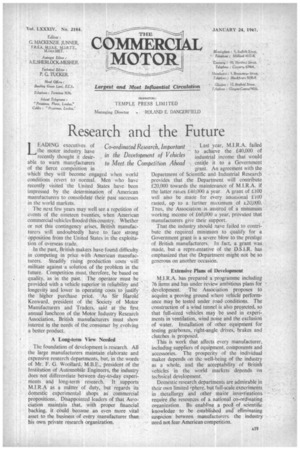Research and the Future
Page 21

If you've noticed an error in this article please click here to report it so we can fix it.
LEADING executives of the motor industry have recently thought it desirable to warn manufacturers of the fierce compelition in which they will become engaged when world conditions revert to normal. Men who have recently visited the United States have been impressed by the determination of American manufacturers to consolidate their past successes in the world markets.
The next few years may well see a repetition of events of the nineteen twenties, when American commercial vehicles flooded this country. Whether or not this contingency arises, British manufacturers will undoubtedly have to face strong opposition from' the United States in the exploitation of overseas trade.
In the past, British makers have found difficulty in competing in price with American manufacturers. Steadily rising production costs will militate against -a solution of the problem in the future. Competition must, therefore, be based on quality, 'as in the past. The operator must be provided with a vehicle superior in reliability and longevity and lower in operating costs to justify the higher purchase price. As Sir Harold' Kenward, president of the Society of Motor Manufacturers and Traders, said at the first annual luncheon of the Motor Industry Research Association. British manufacturers must show interest in the needs of the, consumer by evolving a better product.
A Long-term View Needed The foundation of development is research. All the large manufacturers maintain elaborate and expensive research departments, but, in the words of Mr. F. G. Woollard, IvI.B.E., president of the Institution of Autoinobile Engineers, the industry does not differentiate between day-to-day experiments and long-term research. It supports M.I.R.A as a nuitter of duty, but regards its domestic experimental shops as commercial propositions. Disappointed leaders of that ASFOciation maintain that, with proper financial backing, it could become an even more vitalasset to the business of every manufacturer than his own private research organization. . Last year, M.I.R.A. failed to achieve the £40,000 of industrial income that would entitle it to a Government grant. An agreement with the Department of Scientific and Industrial Research provides that the Department will contribute £20,000 towards the maintenance of M.I.R.A. if the latter raibes £40,000 a year. A grant of t',100 will also be made for every al:tuitional £100 raised, up to a turtner maximum of L20,000. Thus, the Association is assured of a minimum working income of fo0,000 a year, provided that manufacturers give their support.
That .the industry should nave failed to contribute the required minimum to qualify for a Government grant is a severe blow to the prestige of British manufacturers. In fact, a grant was made, but a repreAentative of the D.S.I.R. has emphasized that the Department might not be so generous on another occasion.
Extensive Plans of Development MIRA. has prepared a programme including 76 items and has under review ambitious plans for development. The Association proposes to acquire a proving ground where vehicle performance may be tested under road conditions. The construction of a wind tunnel is also protected, so that full-sized vehicles may be used in experiments in ventilation, wind noise and the exclusion of water. Installation of other equipment for testing gearboxes, right-angle drives, brakes and clutches is proposed.
This is work that affects every manufacturer, including suppliers of equipment, components and accessories. The prosperity of the individual maker depends on the well-being of the industry as a whole, and, the acceptability of British VehicleS in the world Markets depends on technical development.
. Domestic research departments are admirable in their own limited There. but full-scale experiments in Metallurgy and other maiar invfftigations require the resources of a national co-ordinating organization. By•enabling a pool of scientific knowledge to be established and eliminating suspicion between manufacturers, the industry need not fear American competition.












































































